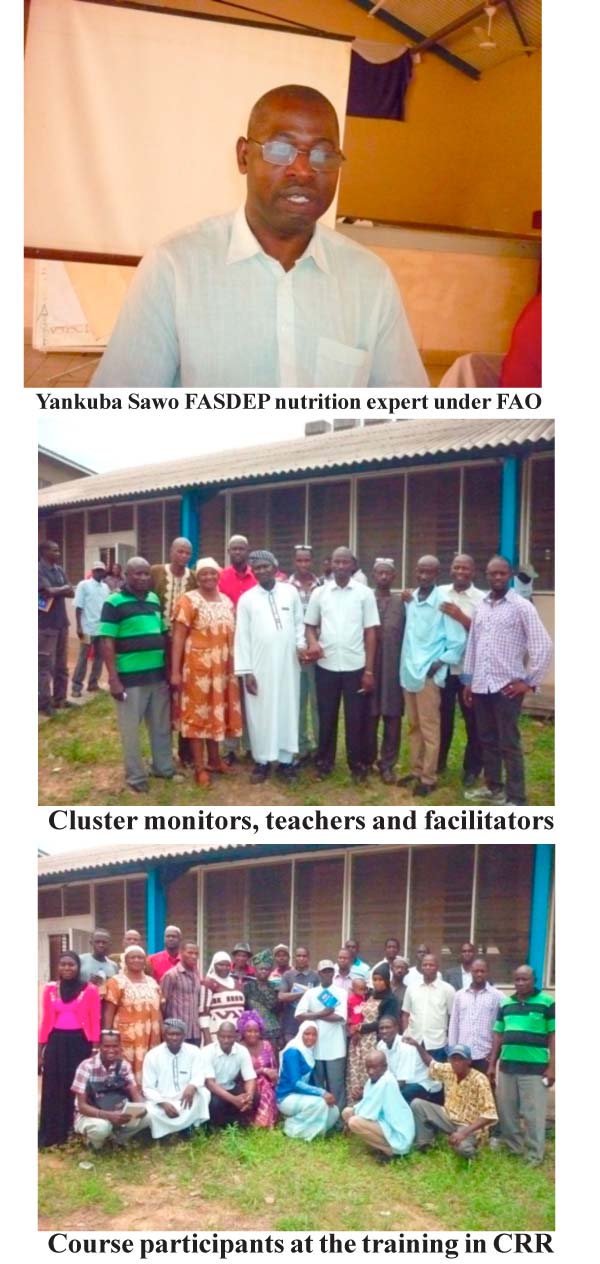
A
four-day Training of Trainers (TOT) course for 30 teachers, including cluster
monitors on nutritional education for Lower Basic Schools recently ended in
Bansang in the Central River Region.
The
training course was organised by FAO under the FASDEP component in partnership
with MoBSE, WFP and NaNA.
Speaking
at the closing ceremony, Yankuba Sawo, FASDEP nutrition expert at the FAO,
expressed his appreciation to the Ministry of Basic and Secondary Education and
the National Nutrition Agency, for their collaboration in developing a
curriculum and implementing nutrition education in Lower Basic Schools.
He
said FAO attaches great importance to food security and nutrition, as this is
an important strategic objective of the organisation.
According
to him, FAO ensures that projects under its purview address the priority areas
agreed with the government of The Gambia.
He
said the Food and Agriculture Sector Development Project (FASDEP) is one of
those projects and, as a technical assistance project to the main FASDEP
investment, it is providing capacity building for nutrition education.
FASDEP
was funded by the Global Agriculture and Food Security Programme (GAFSP) in May
2012, he said, adding that it seeks to reduce rural household poverty, food
insecurity and malnutrition through increased agricultural production,
productivity, commercialisation, nutrition education and resilience building.
The
project has two main components: the Investment Component and the Technical
Assistance Component, with two Supervising Entities (SEs): ADB for the
Investment Component and FAO for the Technical Assistance Component.
The
project covers three administrative regions: the West Coast Region (WCR), Lower
River Region (LRR), and Central River Region (South and North)
Mr
Sawo further said component two of the project, which is on Strengthening
Capacity in nutritional practices and resilience, is being implemented in
partnership with the National Nutrition Agency.
He
stated that good nutrition and education are critical for the development of
children and their future livelihoods.
FAO
recognises the vital contribution that schools could make in the country’s
efforts to achieve food security and building a healthy society, he added.
“Children
are the current and future consumers and need relevant education to form
lifelong healthy eating habits. Eating habits are learned early, and schools
can play an important role in promoting healthy and sustainable dietary
patterns by engaging parents, teachers, food service and food vendor.”
He
added that nutrition education in schools aims to address problems of food
insecurity and malnutrition, by ensuring that school children develop into
healthy, well-educated and productive citizens who could secure their future
livelihoods; hence could contribute better to the country’s overall economic
and social development.
Teachers’
role in this endeavour is paramount, he continued.
The
past four days have been interactive, with extensive discussions on the
contents of the materials developed for pupils in lower basic schools, he
stated.
“I
believe this gives you the opportunity to be quite familiar with the content
and materials, and how to effectively deliver the topics in class for children
to learn. I have no doubt that the four days of training has given you basic
knowledge in nutrition.”
The
pedagogical skills demonstrated during the training course would help them to
deliver the nutrition education effectively, he added.
“I
urge you all to share your knowledge and experience with your colleagues who
have not attended the training, so that the nutrition knowledge will filter
down to the children in your various schools,” he challenged the participants.
Malick
Jammeh, a beneficiary cluster monitor in Janjangbureh, commended the organizers
of the training course, and mentioned the policy 2016 to 2030 with regard to
food and nutrition.
He
said the training would reflect their mind on the school feeding programme,
which is directly looking at the activity of the community with regard to
participation, support of the feeding programme in the form of participation in
the gardens, school farms, etc.
He
said the training course was in line with the policy objectives, and urged the
organizers to continue organizing this type of capacity building for teachers.
Edrisa
Ceesay, teacher at Sinchu Madado Lower Basic School, lauded the organizers for
such a training course for teachers, adding that the importance attached to
this training activity could not be over-emphasised as the training course had
yielded a lot of positive impact to their knowledge.
Mariama
Jawla, a teacher from Bansang lower Basic school and a beneficiary of the
training course, said she was very much impressed about the training course in
the sense that it has added more to her knowledge.
Speaker
after speaker all expressed the need to have such training courses, and also
described the training activity as fruitful and interactive.
“We
are grateful and thankful to FAO for their technical support in empowering the
teachers on nutritional education, which is a very important thematic area,”
one of them said.



